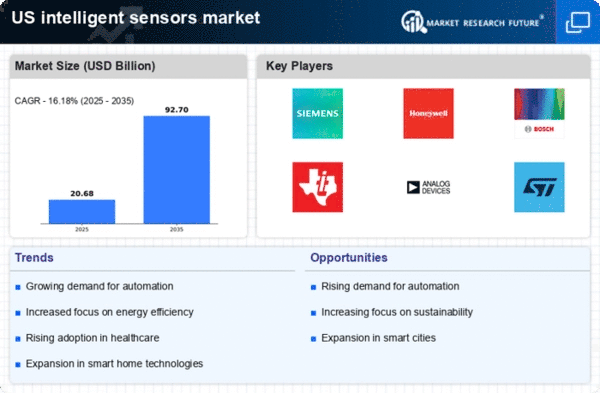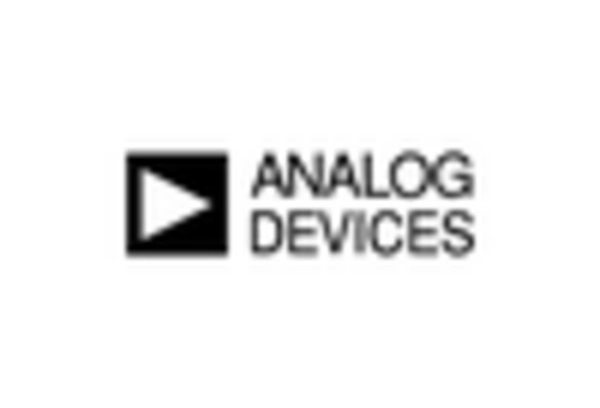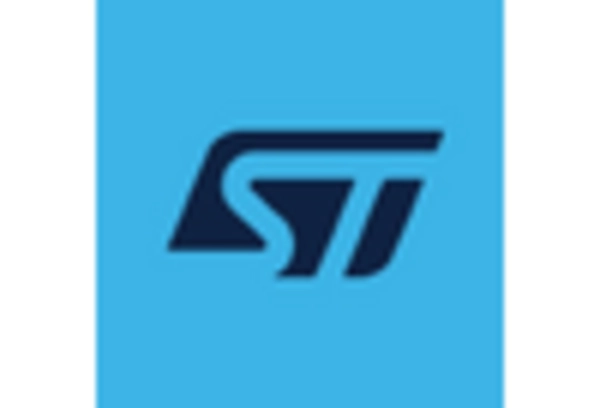Rising Demand for Smart Cities
The push towards smart city initiatives is significantly influencing the intelligent sensors market. As urban areas in the US strive to enhance infrastructure and improve quality of life, the integration of intelligent sensors becomes essential. These sensors facilitate efficient traffic management, energy consumption monitoring, and waste management, contributing to sustainable urban development. According to recent estimates, investments in smart city technologies are expected to exceed $100 billion by 2025 in the US. This trend indicates a growing recognition of the importance of intelligent sensors in creating interconnected urban environments. The intelligent sensors market is poised to capitalize on this demand, as municipalities increasingly adopt these technologies to address urban challenges.
Technological Advancements in IoT
The rapid evolution of Internet of Things (IoT) technologies is a primary driver for the intelligent sensors market. As IoT devices proliferate, the demand for intelligent sensors that can seamlessly integrate and communicate with these devices increases. In 2025, the IoT market in the US is projected to reach approximately $1 trillion, indicating a robust growth trajectory. Intelligent sensors play a crucial role in this ecosystem by providing real-time data and enhancing automation capabilities. This integration not only improves operational efficiency but also enables predictive maintenance, thereby reducing costs. The intelligent sensors market is likely to benefit significantly from these advancements, as businesses seek to leverage IoT for smarter decision-making and enhanced productivity.
Expansion of Automotive Applications
The automotive sector is experiencing a transformation with the integration of intelligent sensors, which is a key driver for the intelligent sensors market. As vehicles become more connected and autonomous, the demand for advanced sensor technologies is surging. Intelligent sensors are essential for applications such as collision avoidance, adaptive cruise control, and vehicle-to-everything (V2X) communication. The US automotive market is projected to reach $1 trillion by 2025, with a significant portion attributed to smart vehicle technologies. This growth presents a substantial opportunity for the intelligent sensors market, as manufacturers seek to enhance vehicle safety and performance through innovative sensor solutions.
Increased Focus on Energy Efficiency
The growing emphasis on energy efficiency is driving the intelligent sensors market forward. With rising energy costs and environmental concerns, businesses and consumers alike are seeking solutions to optimize energy consumption. Intelligent sensors enable real-time monitoring and control of energy usage, leading to significant cost savings. In the US, the energy management systems market is projected to grow at a CAGR of over 15% through 2025, highlighting the increasing reliance on intelligent sensors for energy efficiency. The intelligent sensors market is likely to see substantial growth as organizations implement these technologies to meet regulatory requirements and achieve sustainability goals.
Growing Adoption in Industrial Automation
The trend towards industrial automation is significantly impacting the intelligent sensors market. As manufacturers in the US increasingly adopt automation technologies, the need for intelligent sensors to monitor and control processes becomes paramount. These sensors provide critical data that enhances operational efficiency, reduces downtime, and improves product quality. The industrial automation market is expected to grow at a CAGR of around 10% through 2025, indicating a strong demand for intelligent sensors. The intelligent sensors market is likely to thrive as companies invest in automation solutions to remain competitive and meet the demands of a rapidly evolving manufacturing landscape.















